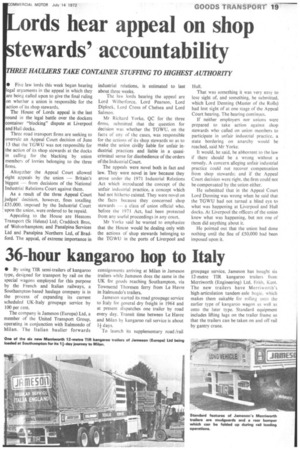ords hear appeal on shop tewards' accountability
Page 21

If you've noticed an error in this article please click here to report it so we can fix it.
THREE HAUIJERS TAKE CONTAINER STUFFING TO HIGHEST AUTHORITY
• Five law lords this week began hearing egal arguments in the appeal in which they are being called upon to give the final ruling on whether a union is responsible for the action of its shop stewards.
The House of Lords appeal is the last round in the legal battle over the dockers container "blacking" dispute at Liverpool and Hull docks.
Three road transport firms are seeking to overrule an Appeal Court decision of June 13 that the TGWU was not responsible for the action of its shop stewards at the docks in calling for the blacking by union members of lorries belonging to the three firms.
Altogether the Appeal Court allowed eight appeals by the union — Britain's biggest -from decisions of the National Industrial Relations Court against them.
As a result of the three Appeal Court judges' decision, however, fines totalling £55,000, imposed by the Industrial Court upon the union, were ordered to be repaid.
Appealing to the House are Heatons Transport (St Helens) Ltd; Craddock Bros, of Wolverhampton; and Panalpina Services Ltd and Panalpina Northern Ltd, of Bradford. The appeal, of extreme importance in industrial relations, is estimated to last about three weeks.
The law lords hearing the appeal are Lord Wilberforce, Lord Pearson, Lord Diplock, Lord Cross of Chelsea and Lord Salmon.
Mr Richard Yorke, QC for the three .firms, submitted that the question for decision was whether the TGWU, on the facts of any of the cases, was responsible for the actions of its shop stewards so as to make the union civilly liable for unfair industrial practices and liable in a quasicriminal sense for disobedience of the orders of the Industrial Court.
The appeals were novel both in fact and law. They were novel in law because they arose under the 1971 Industrial Relations Act which introduced the concept of the unfair industrial practice, a concept which had not hitherto existed. They were novel on the facts because they concerned shop stewards — a class of union official who, before the 1971 Act, had been protected from any useful proceedings in any court.
Mr Yorke said he wanted to emphasize that the House would be dealing only with the actions of shop stewards belonging to the TGWU in the ports of Liverpool and Hull.
That was something it was very easy to lose sight of, and something, he submitted, which Lord Denning (Master of the Rolls) had lost sight of at one stage of the Appeal Court hearing. The hearing continues.
If neither employers nor unions were prepared to take action against shop stewards who called on union members to participate in unfair industrial practice, a state bordering on anarchy would be reached, said Mr Yorke.
It would, he said, be abhorrent to the law if there should be a wrong .without a remedy. A concern alleging unfair industrial practice could not recover compensation from shop stewards; and if the Appeal Court decision were right, the firm could not be compensated by the union either.
He submitted that in the Appeal Court Lord Denning was wrong when he said that the TGWU had not turned a blind eye to what was happening at Liverpool and Hull docks. At Liverpool the officers of the union knew what was happening, but not one of them did anything about it.
He pointed out that the union had done nothing until the fine of £50,000 had been imposed upon it.






























































































